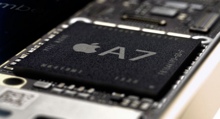iPhone 5s 64-bit A7 chip is a 'marketing gimmick,' says Qualcomm exec


While many pundits and consumers seem to have been impressed by the 64-bit A7 processor powering Apple's new iPhone 5s, rival chipmaker Qualcomm has labeled it a "marketing gimmick" and claims that it offers consumers "zero benefit."
The claim was made during an interview earlier this week by Anand Chandrasekher, senior vice president and chief marketing officer at Qualcomm.
"I know there's a lot of noise because Apple did [64-bit] on their A7," said Chandrasekher. "I think they are doing a marketing gimmick. There's zero benefit a consumer gets from that."
"Predominantly... you need it for memory addressability beyond 4GB. That's it. You don't really need it for performance, and the kinds of applications that 64-bit get used in mostly are large, server-class applications," said Chandrasekher.
Featured
Technically this is not accurate since ARM's Cortex-A15 silicon 40-bit Large Physical Address Extensions that allows for the addressing of 1TB of RAM, although under this setup address space continues to be limited to 32-bit per process.
Chandrasekher did however concede that Qualcomm will eventually come out with a 64-bit processor because " OS guys will want it at some point in time."
Prior to his move to Qualcomm, Chandrasekher was a senior vice president at Intel, and general manager of the Ultra Mobility Group.
Despite the 64-bit architecture, the iPhone 5s still only has 1GB of RAM. However, benchmarks tests show that Apple's A7 dual-core silicon is faster than the 1.9GHz quad-core Qualcomm Snapdragon processor powering the Samsung Galaxy S4 (which much be a double blow for Samsung since it manufactures the A7 for Apple), and holding its own against the 2.2GHz quad-core Qualcomm Snapdragon 800 inside the Sony Xperia Z1.
Based on this alone, there seems to be more to the A7 than just marketing gimmicks.